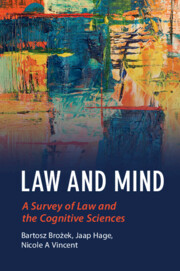Book contents
- Law and Mind
- Law and the Cognitive Sciences
- Law and Mind
- Copyright page
- Contents
- Figures
- Contributors
- Acknowledgements
- 1 Introduction
- I Metatheory and Methodology
- II Ontology and Epistemology
- III Legal Doctrine and Cognitive Sciences
- 11 Private Law and Cognitive Science
- 12 Private Law and Cognitive Science: A Methodological Commentary
- 13 Responsibility, Liability, and Retribution
- 14 Guilt in Criminal Law: Guilt in Us or in the Stars?
- 15 The Insanity Defense
- 16 Thoughts on the Insanity Defence
- IV Evidence
- V Dissenting Opinions
- References
11 - Private Law and Cognitive Science
from III - Legal Doctrine and Cognitive Sciences
Published online by Cambridge University Press: 21 April 2021
- Law and Mind
- Law and the Cognitive Sciences
- Law and Mind
- Copyright page
- Contents
- Figures
- Contributors
- Acknowledgements
- 1 Introduction
- I Metatheory and Methodology
- II Ontology and Epistemology
- III Legal Doctrine and Cognitive Sciences
- 11 Private Law and Cognitive Science
- 12 Private Law and Cognitive Science: A Methodological Commentary
- 13 Responsibility, Liability, and Retribution
- 14 Guilt in Criminal Law: Guilt in Us or in the Stars?
- 15 The Insanity Defense
- 16 Thoughts on the Insanity Defence
- IV Evidence
- V Dissenting Opinions
- References
Summary
This article explores how cognitive science can inform the theory and practice of private law. In the light of the findings about human mind and behavior, it scrutinizes the assumptions private law makes about what human beings are and what they do. Further, it shows that cognitive science can help lawyers not only to understand the world better, but also to more effectively draft rules governing it.
The image of a human presupposed by private law – homo legalis privatus – is someone having free will and consciously directing their behavior to align with adopted goals and intentions; someone who understands the consequences of their actions and might be held responsible for the concluded contracts and the committed torts. Cognitive science does not compel us to deem any of these assumptions untrue or incorrect, but it does invite more caution when adopting strong binaries and assuming that humans always perform at the peak of their capacity. How to assess these presuppositions will depend on one’s normative view of the role of private law in our societies. The chapter compares the roles assumptions play in the behavior-guiding and deontological theories of private law, and argues that for the former what matters is usefulness, while the latter focuses on truth. Which approach to take, however, is not a scientific or legal choice, but a political one.
Further, cognitive science can help lawyers understand the changing nature of the private law society in the digitally mediated, cognitively driven marketplace. Private law presupposes not only certain features of natural persons, but also the types of actions they undertake, types of relations they engage in, and types of objects they control. These elements, in turn, are contingent upon the state of technology, culture, and science. Currently, new types of activities occur, like micro-targeted behavioral advertising; and new types of commodities, like humans’ attention and future conduct form objects of private law relations. These transformations result directly from the application of cognitive insights by corporations, and their will to develop new knowledge about people’s preferences and behavior. The chapter takes a closer look at the emergence of this novel phenomenon – “private cognitive science” – partly caused by, and partly demanding a response from, private law.
- Type
- Chapter
- Information
- Law and MindA Survey of Law and the Cognitive Sciences, pp. 217 - 248Publisher: Cambridge University PressPrint publication year: 2021
References
- 1
- Cited by

